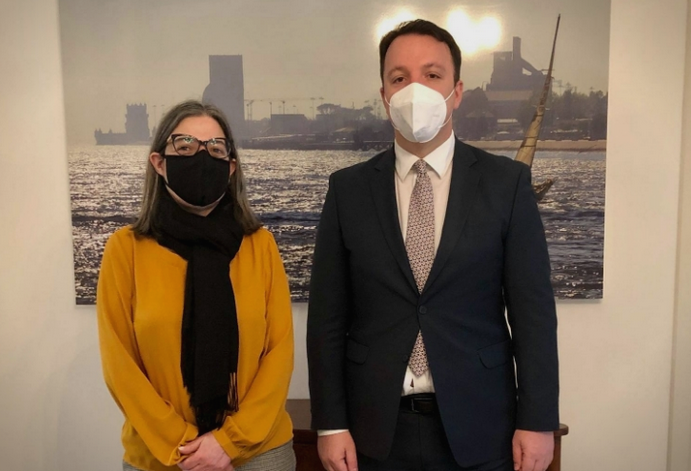VMRO-DPMNE Vice President Aleksandar Nikoloski met with the Portuguese Ambassador Maria Virginia Mendes de Silva Pina, in Belgrade where the Ambassador is resident. Nikoloski is meeting ambassadors of EU member states to Macedonia, in his capacity as chairman of the Euro-Integration Council, and Portugal holds the rotating presidency with the EU.
Following the meeting, Nikoloski noted that the latest Transparency International report, which ranked Macedonia at its historic worst place in terms of corruption levels (111th in the world) is a major cause for concern.
We discussed the current political and economic situation in Macedonia with the Ambassador, and I informed her about the worryingly high level of corruption that is noted in the latest Transparency International report, with the lowest ever ranking for Macedonia at the 111th place. I also informed her about the delays in the necessary reforms, as well as the healthcare and economic crisis Macedonia is facing. Tere is lack on the part of the Government to implement reforms, and its moves sadly indicate crime and corruption, Nikoloski said.
Macedonia is currently being blocked from opening EU accession talks by Bulgaria. Nikoloski said that there are red lines Macedonia can’t negotiate about.
I emphasized that we can’t talk about the Macedonian national identity, the uniqueness of the Macedonian language, the Macedonian nation and the Macedonian culture. These are the pillars of the Macedonian statehood and they are non-negotiable, Nikoloski added.
Nikoloski is the first Macedonian politician to meet with the Portuguese Ambassador after Portugal took over the presidency. He invited Ambassador Pina to visit Macedonia and meet with the Euro-Integration Council, and asked that Macedonia is allowed to open the accession talks as soon as possible.
Chairman Nikoloski stated that it is high time that our country opens the EU accession talks and suggested that this should happen during the Portuguese presidency of the EU. He informed the Ambassador about the idea to create a National Council for Euro-Integration, which would have an inclusive character and would help build and sustain the consensus for EU membership. Nikoloski expressed his hope for a fruitful cooperation and asked for support to enhance the capacity of the Parliament to contribute to the EU integration process, a state release informed.





Comments are closed for this post.